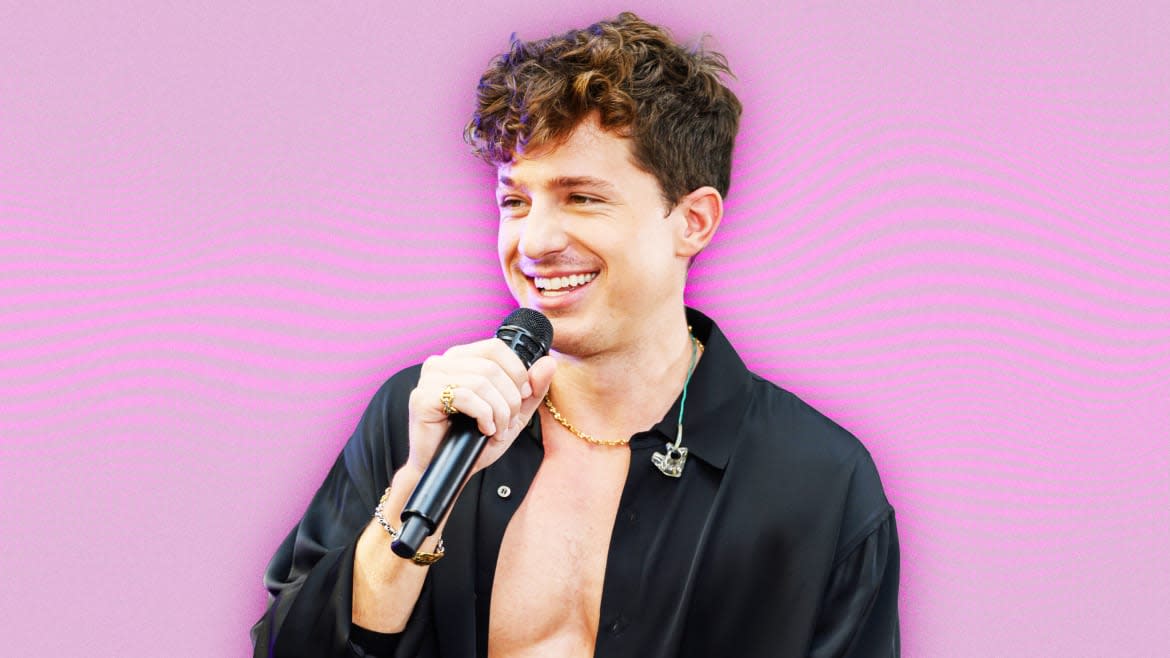Charlie Puth’s New Album Is What Happens When You Don’t Log Off

- Oops!Something went wrong.Please try again later.
Charlie Puth is a living, frustrating conundrum.
Here we have an undeniably gifted, sharp-minded musician with a handful of hit songs and Grammy nominations to his name. He’s funny, even if his inclination for shock chortles induces more eye rolls than legit laughs. He’s charismatic, typically oversharing in interviews instead of sticking to boring, PR-approved soundbites. He’s got perfect pitch. And yet, when it comes to his music, the man can’t stop getting his own way. Case in point: CHARLIE, Puth’s third studio album, which arrived Friday and suffers from undercooked, TikTok-baiting pop songs that could have been so much more.
At first, the concept behind CHARLIE seemed like an interesting one—as Puth himself described, it was an album “born on the internet.” Over the past year and a half, he’s documented the creation of these dozen tracks on TikTok, giving fans a peek into his process by building songs around random sounds or instrumentals. It gave the Berklee-educated musician a chance to flex his chops, which at times came across as dorky and high-handed, but mostly succeeded in endearing fans to his musical nerd persona.
Unfortunately, TikTok may have stunted Puth’s vibe; spending months presenting yourself as some kind of quirky music guru only works if the end result is actually impressive. Instead, CHARLIE is generic-sounding pop that suffers from too many underbaked tracks, most of which come to a vexing halt after two verses and choruses. That’s fine in some cases—sometimes it’s best to leave the people wanting more—but here, it feels like TikTok’s palate for short attention spans crippled Puth’s songwriting and made him a lazier musician than he really is. Just ask Taylor Swift fans about the power of a good bridge.
“There’s a First Time for Everything,” for instance, finds Puth tearing and tongue-twisting his way through the punk-lite verses, sounding like Mark Hoppus at his perkiest but most rushed. “Marks on My Neck” similarly ends prematurely after two “Jessie’s Girl”-esque verses, as well as a drum fill before the second hook that would’ve worked better as a climatic moment instead of a hurried afterthought.
CHARLIE isn’t all misses. Lead single “Light Switch” is a groovy, fully fleshed earworm that clicks; just ask any pop radio station in the country. Ditto with the finger-snapping “Loser,” which features a funky bass line (à la Puth’s best single to date, “Attention”) as he muses, “I’m a loser, why’d I have to lose her? / I’ll never recover, I’ll never be fine.”
To be sure, CHARLIE is a breakup album (heavily rumored to chronicle his past relationship with singer Charlotte Lawrence), but mercifully, it’s not a mopey one. Instead, Puth diffuses the tension in his subject matter by going all-in on the ’80s with mostly upbeat, bright, and synth-heavy tracks. On the catchy “Tears on My Piano”—which is not actually a piano song at all, but a foot-stomping bop with an instantly singable hook—he cleverly mocks himself for making sad songs: “All I make is music for crying,” he bemoans. Meanwhile, his earnest attempts at balladry, namely the actually piano-driven torch song “When You’re Sad I’m Sad,” is a falsetto-flaunting snooze. Same goes for album closer “No More Drama,” which serves up zero musical thrills but at least finds Puth in a happier headspace. “I got no more drama in my life and it’s such a blessing / I’m so glad I finally realized I’m better off without you,” he sings. (Glad you’re doing well, Charlie. Now get back to making better music.)
If CHARLIE is any indication, Puth still hasn’t struck the right chord (perfect pitch be damned) in the pop space. After breaking through in 2016 with his utterly charmless debut album, Nine Track Mind, he leveled up in a big way with 2018’s Voicenotes, which he weirdly said he’s only 60 percent proud of in a recent interview, despite it being his best work thus far. That album was full of slinky confidence and charisma, boasting features with the likes of Boyz II Men and Kehlani, buoyed by bold musical choices and finely detailed lyricism.
Charlie Puth Is the Latest Male Celeb to Queerbait for Likes
Unfortunately, Voicenotes was largely slept on, which is perhaps why we have what we have now: a gimmicky album era marked by little other than a middling duet with BTS’ Jung Kook, a series of butt-baring thirst traps, and a concert performed in the Metaverse. (At the very least, we can take solace that CHARLIE is an upgrade from the “bad boy” phase Puth attempted in 2019 with the trio of “I Warned Myself,” “Mother,” and “Cheating On You,” none of which cracked the Hot 100. Even Elton John told him those songs sucked.)
Some have suggested that Puth should go the Ryan Tedder route and focus his efforts on crafting hits for other artists. That’s certainly worked well for him as of late—he wrote and produced the Kid Laroi and Justin Bieber smash “Stay,” which topped the Hot 100 for seven non-consecutive weeks after its release last year. And yet, one can’t help but hope that Puth will once again harness his musical powers for good. Maybe he just needs to take a sabbatical from TikTok first.
Get the Daily Beast's biggest scoops and scandals delivered right to your inbox. Sign up now.
Stay informed and gain unlimited access to the Daily Beast's unmatched reporting. Subscribe now.

